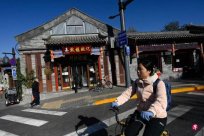Source: Hong Kong Zhongtong News Agency
Since Argentina's new President Mirley took office this month, it has been promoted to a big reform plan.However, as of the 16th, 11 provinces in Argentina have announced that in response to the significant reduction of expenses in the central government and entering the state of economic emergency.This is closely related to the "shock therapy" led by Miller.
"Shock Therapy" is a overall economics solution. It is proactive and suddenly relaxed prices and monetary control by the state, reducing state subsidies, and rapid trade liberalization.Along with the state -controlled public assets, a large -scale privatization measures are carried out.
According to previous reports, the new Miller government wants to use "shock therapy" to save Argentina's high inflation rate.Argentina's new economic minister Kapo announced a series of economic policies on the 12th to reduce fiscal deficit and control inflation.These include reducing government departments from 18 to 9, reducing the government's subsidies for energy and transportation, stopping the bidding of new public projects and canceling the development projects that have not yet started.It is reported that these economic measures have triggered the financial difficulties of these provinces to varying degrees, and some provinces may face challenges on the issue of paying the salary of civil servants this month and January next year.
In addition, the Argentine New Government Economic Minister of Economic Minister Louis Kapo announced the first batch of economic measures of the Mirley government through a video on the 12th.This includes the reduction of the official exchange rate to $ 1 against 800 pesos, which means that the peso depreciates 54%.
Can "shock therapy" take effect on Argentina?Jiang Shixue, a special professor at Shanghai University, said in an interview with the Hong Kong News Agency on the 18th that "shock therapy" may not have failed.In the early 1980s, Bolivia, South America, had a shock therapy, and the results were successful.But Russia's "shock therapy" failed.
Jiang Shixue further explained that "shock therapy" is generally used to deal with inflation.The reason why Bolivia's shock therapy was successful is to restrict the amount of currency issuance, and the Argentina situation may not be the case.Argentina's inflation is mainly due to problems, insufficient supply, and demand greater than supply, which leads to inflation.Therefore, Miller's "shock therapy" may not be able to succeed.The urgency of Argentina's economy is to expand production and stimulate producers' enthusiasm.
For the withdrawal of government departments, Jiang Shixue pointed out that it can be understood as two purposes, one is to improve the efficiency of government work; the second saves government expenditures, but if the government departments are lacking, the accumulation of things, that efficiency is piled up, that efficiencyIt may be reduced.
In addition, Liu Chunsheng, an associate professor at the School of International Economics and Trade, China Central University of Finance and Economics, also told Hong Kong Zhongtong News Agency on the same day that the new President of Argentina may want to adopt a very extreme method.See if there is the possibility of saving Argentina's economy.However, from a historical perspective, the previous trial effect of "shock therapy" was not good, so it is not optimistic about the so -called "new policy" this time in Argentina.Its damage to the economy is actually very large.In addition, directly cut off government departments, then the operation of macroeconomics and state management may fall into chaos, which will fight against Argentina's economy.



